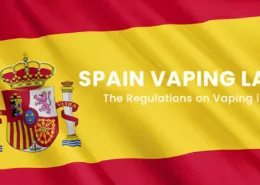Canary Islands to Tax Vaping and E-Cigarettes
Regional Government Leads Spanish Initiative in Line with European Majority
The Government of the Canary Islands, an autonomous community in Spain, will impose a tax of 0.10 euros per milliliter on vaping products and e-cigarettes starting in 2024, according to the articulated text of the modification to the law regulating the tax on tobacco products. This measure, included in the draft budget for the Autonomous Community for the upcoming year, positions the Canary Islands as the first Spanish region to collect specific taxes on these products, until the central government is expected to do so for the rest of the autonomous regions.
As the only autonomous community in the country with direct competencies in this matter, the Canary Islands has adapted the fiscal recommendations issued by both the European Union and the central government. The majority of EU states, including Germany, Belgium, Bulgaria, Cyprus, Denmark, Slovenia, Estonia, Finland, Greece, Hungary, Italy, Latvia, Lithuania, Poland, Portugal, Czech Republic, Romania, and Sweden, have legislated in the same direction, albeit with varying tax amounts.
The regional government will tax liquids for vaporizers and any device, whether or not it contains nicotine, to hinder access, especially for young people, and prevent initiation to the habit. The latest Survey on Drug Use in Secondary Education in Spain (Estudes) 2023 shows a sharp increase in the number of students who have tried e-cigarettes at least once, reaching 54 percent, compared to 44.3 percent in the previous 2021 data. More than half of them have done so with products that do not include nicotine.
In 2020, the Council of the EU issued a recommendation on these new tobacco products or substitutes, “regardless of whether or not they contain nicotine,” stating that it was “urgent and necessary to update the regulatory framework” of member countries to avoid “legal uncertainty and the presence of regulatory disparities.”
Potential Revenue Impact
While the impact on public revenue in the Canary Islands is unknown, according to estimates from the Ministry of Health in its report ‘Review on the taxation of electronic cigarettes: European regulation and possible scenarios for Spain,’ the increase in public revenue across the country could range between 7 and 48 million euros, depending on the chosen tax.
The text of the new Canary Islands law creates a separate category for e-cigarette liquids and another for heated tobacco products, which will also have a specific tax, although these were already taxed under the heading of ‘other tobacco products.’ Heated tobacco will be taxed at 28 euros per kilo of tobacco, following the practice of most European countries.
Additionally, the new Canary Islands text updates the levies for most products, increasing cigars and cigarillos from 2 percent to 4 percent and other tobacco products from 5 to 10 percent. The tax on cigarettes remains at 37 euros per 1,000 cigarettes in general, or up to 63 euros per 1,000 when the retail price is lower than the reference price. The fiscal equalization process for black tobacco is accelerated, with equalization set for 2026 instead of the previously planned 2030.
- Malaysia Negeri Sembilan Backs Vape Ban, Awaits Clear Laws - August 5, 2025
- Is It Illegal to Vape or Smoke While Driving in Massachusetts? - August 5, 2025
- Austria Plans to Ban Disposable E-Cigarettes - August 5, 2025









